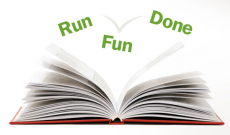
Email: ZYVC057@live.rhul.ac.uk
Total Article : 213
About Me:I'm a graduate student studying International Criminal Law and first started writing for King's News almost 4 years ago! My hobbies include reading, travelling and charity work. I cover many categories but my favourite articles to write are about mysteries of the ancient world, interesting places to visit, the Italian language and animals!

There are many ways of rhyming. Rhymes can be, for example, true rhymes or off rhymes. True rhymes are when word rhyme when listening to them but they also have the last few letters spelt the same on paper. For example, ‘cat’ and ‘mat’, ‘light’ and ‘night’ are all true rhymes. Off rhymes are instead when two words sound the same but are spelt differently. This occurs because the final vowel or constant sounds have a similar pronunciation when spoken. ‘Fate’ and ‘saint’ is a good example of two words which sound the same but the last few letters are spelt differently hence it isn’t a true rhyme. Off rhymes make use of assonance and consonance.
Assonance is when two vowels produce similar sounds when we speak, for example ‘mean’ and ‘beet’ have different vowels but they both have a similar ‘e’ sound when spoken aloud. On the other hand, consonance is when two consonant sounds are quite similar. For example, ‘cake’, ‘book’ and ‘back’ have a similar ‘k’ sound. Consonance should not be confused with alliteration, which is when two words start with the same letter or there is a recurrence of this letter in words which are close together, for example ‘see sunny Sunnydale’.
The benefit of using off rhymes is that you have more words to choose from when finding a rhyme. The advantage is that you are able to create more innovative, unsuspected rhymes and make your poem more original and unpredictable. Countless songs and poems rhyme ‘above’ with ‘love’ because there are only so many words that actually rhyme with it. BY choosing to use off rhyming schemes you can expand your word choice and get rid of the predictability people could encounter when reading your poem!
Below is the famous poem ‘daffodils’ by William Wordsworth that we analysed in a previous article and some questions for you think consider.
1) Can you find any off rhymes?
2) Do you recognise the rhyming scheme?
3) Can you find any other words that rhyme with ‘daffodils’?
4) What effect do the true rhymes and off rhymes have on the reader?
5) Do you think the rhymes add musicality to the poem?
If so comment below!
Daffodils
I wandered lonely as a cloud
That floats on high o'er vales and hills,
When all at once I saw a crowd,
A host, of golden daffodils;
Beside the lake, beneath the trees,
Fluttering and dancing in the breeze.
Continuous as the stars that shine
And twinkle on the milky way,
They stretched in never-ending line
Along the margin of a bay:
Ten thousand saw I at a glance,
Tossing their heads in sprightly dance.
The waves beside them danced; but they
Out-did the sparkling waves in glee:
A poet could not but be gay,
In such a jocund company:
I gazed—and gazed—but little thought
What wealth the show to me had brought:
For oft, when on my couch I lie
In vacant or in pensive mood,
They flash upon that inward eye
Which is the bliss of solitude;
And then my heart with pleasure fills,
And dances with the daffodils.
Image: http://www.writeexpress.com/g/rhymingdictionary.jpg

0 Comment:
Be the first one to comment on this article.